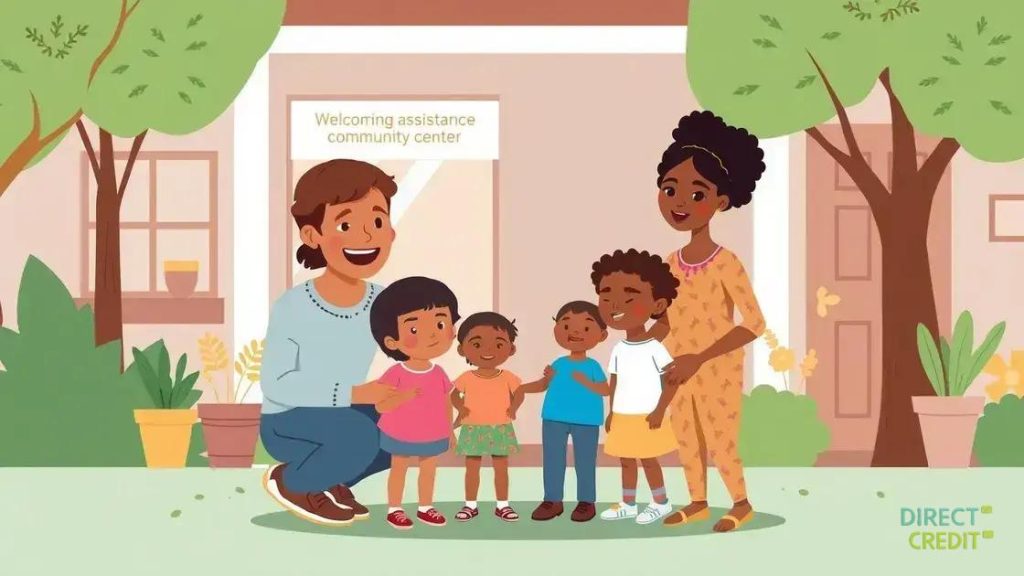Changes in public housing assistance reveal crucial updates

Changes in public housing assistance include revised eligibility criteria, streamlined application processes, and a focus on sustainability, aimed at improving access to affordable housing for low-income families.
Changes in public housing assistance are reshaping the landscape for many families. Have you wondered how these updates might affect your housing options? Let’s dive into the specifics.
Understanding public housing assistance
Understanding public housing assistance is essential for those seeking affordable housing options. This system aims to help individuals and families secure decent housing when faced with financial challenges. Knowing how it works can empower you to make informed decisions about your housing needs.
What is Public Housing Assistance?
Public housing assistance refers to government programs designed to provide support for low-income individuals and families. These programs help with rental costs and offer various types of aid, depending on the specific needs of the applicants.
Types of Assistance Available
There are multiple forms of housing assistance:
- Housing Choice Vouchers: Allow low-income families to rent in the private market.
- Public Housing: Offers affordable housing units managed by local housing authorities.
- Project-Based Rental Assistance: Ties subsidies to specific housing projects.
- State and Local Programs: Provide additional support tailored to local needs.
Each of these options targets different challenges, ensuring a broader range of assistance for those in need. Understanding which program suits your situation best is crucial.
Eligibility Criteria
Eligibility for public housing assistance usually depends on several factors, including income level and family size. Families typically need to provide documentation of their income and may also be subject to background checks. While these programs offer vital support, strict eligibility requirements can limit access for some individuals.
Keep in mind that waiting lists are common, especially in high-demand areas, making it essential to apply as soon as you meet the criteria. Being aware of the application process can streamline your experience and enhance your chances of securing assistance.
Navigating the Application Process
Applying for assistance can feel overwhelming. Here are some steps to help:
- Gather necessary documents: Prepare income statements, IDs, and any required applications.
- Contact local housing authorities: They can provide guidance and clarify your options.
- Stay updated on your application status: Follow up to ensure all requirements are being met.
By understanding these steps, you can approach the process more confidently. Don’t hesitate to reach out for help, whether it’s from family, friends, or local organizations advocating for housing rights.
Recent changes and their implications

Recent changes in public housing assistance programs have transformed the way support is provided to low-income families. These modifications aim to address current economic challenges while improving accessibility and efficiency.
New Policies and Regulations
One significant change is the introduction of new policies aimed at increasing funding for affordable housing projects. This includes:
- Increased federal funding: More resources have been allocated to local housing authorities.
- Streamlined application processes: Efforts have been made to simplify the paperwork required for assistance.
- Greater focus on vulnerable populations: Policies now prioritize help for seniors, disabled individuals, and families with children.
These adjustments aim to make public housing assistance more responsive to the needs of the community.
Impact on Applicants
With the new changes in place, many applicants may experience faster processing times. This can lead to quicker access to housing services, which is crucial for families in urgent need. For some, receiving assistance can now take just weeks instead of months.
However, it’s essential to remember that while these developments look promising, they also come with increased competition. As more people discover these options, the pool of applicants may grow. Being prepared with the necessary documentation and understanding the criteria can help individuals navigate this new environment.
Future Directions
The implications of these changes extend beyond immediate assistance. They signal a shift towards a more inclusive approach to solving housing problems. As communities adapt, ongoing evaluation of program effectiveness will be vital to ensure that these efforts continue to meet the diverse needs of residents.
Residents should also stay informed about future changes to housing policies, as these adjustments can lead to improved benefits and opportunities for accessing affordable housing. By keeping updated, individuals can ensure they make the most of the resources available to them.
Eligibility criteria updates
Eligibility criteria updates for public housing assistance are essential for ensuring that the right individuals receive the help they need. These updates can create significant changes in how families qualify for support, affecting their ability to secure affordable housing.
Key Updates to Eligibility
Recent adjustments have improved the clarity and accessibility of the eligibility process. Changes include:
- Income limits: The maximum income levels that families can earn to qualify have been revised to reflect current economic conditions.
- Family size considerations: The number of people in a household is now weighed more heavily in determining eligibility, providing better access for larger families.
- Residency requirements: Adjustments to residency rules can allow more people to apply for assistance, including those who may be new to an area.
These updates are designed to make the application process fairer and more inclusive for those who need help.
Impact of Adjustments on Families
The changes in eligibility criteria have led to a more diverse group of applicants qualifying for assistance. Families may find they meet the new requirements even if they previously didn’t. It’s crucial for applicants to review these criteria thoroughly before applying, as the new guidelines could dramatically affect their chances of receiving support.
Moreover, with the modified focus on family size, those with additional dependents may see an increase in their eligibility status. This change highlights a growing recognition of the importance of accommodating families of all sizes in the assistance process.
Staying Informed
It is important for potential applicants to stay updated on any future changes to eligibility requirements. Following local housing authority announcements and checking their websites can provide the latest information. Moreover, attending community meetings can help families understand how these changes affect them.
Engaging with local resources and support organizations can also ensure that families are equipped with the knowledge they need to navigate the housing assistance landscape effectively.
How to apply for housing assistance
Applying for housing assistance can seem challenging, but understanding the process can make it much easier. Knowing the steps involved helps ensure you’re prepared and increases your chances of receiving support.
Gather Required Documents
The first step in the application process is to collect all necessary documents. Common documents include:
- Proof of income: Pay stubs, tax returns, or bank statements.
- Identification: Driver’s license, passport, or Social Security card.
- Rental history: Information about previous addresses and landlords.
- Family composition: Details about all household members, including ages and relationships.
Having these documents ready can speed up the application process.
Finding the Right Program
Next, research local housing assistance programs. Different areas may offer various types of aid, so it is essential to find the right fit for your situation. Websites of local housing authorities are great resources for finding available programs.
It’s also a good idea to check for any specific eligibility requirements for each program. Understanding what is needed can help you tailor your application effectively.
Completing the Application
Once you have identified a suitable program and gathered your documents, it’s time to complete the application. Most applications can be filled out online, but some may require paper forms. Ensure you provide accurate information and follow all instructions.
Don’t hesitate to ask for help. Local organizations often have staff available to assist with the application process, making it more accessible for those who need guidance.
Submitting Your Application
After filling out the application, review all your details before submitting. Double-check your documents to ensure everything is correct. Once satisfied, submit your application according to the program’s instructions.
Keep a copy of your application and any submission confirmations. This can be helpful if any issues arise later in the process.
Follow Up
After submitting, follow up regularly. Many programs will provide updates on your application status. Staying informed can help you catch any problems early and ensure a smoother process.
Future trends in housing support
Future trends in housing support are evolving to better address the needs of communities. As challenges grow, innovative solutions are on the rise to enhance accessibility and affordability of housing for everyone.
Increased Use of Technology
One major trend is the integration of technology in housing assistance programs. Utilizing software to streamline applications and track resources can significantly improve efficiency. Online platforms are becoming more common, allowing applicants to easily access information and submit their documentation. This not only saves time but also increases transparency in the process.
Focus on Sustainability
Another important trend is the emphasis on sustainable housing solutions. Future housing support programs are likely to prioritize eco-friendly building practices. This includes:
By focusing on sustainability, housing support can create lasting benefits for communities while addressing environmental concerns.
More Inclusive Policies
Future trends indicate a shift towards more inclusive policies. As societal awareness grows, programs may better cater to marginalized groups, including individuals with disabilities and the elderly. This could involve tailored housing options that consider the unique requirements of these populations. Furthermore, community involvement in the planning process can ensure that local needs are met, making housing support more responsive and effective.
In addition, there may be an increased emphasis on affordable housing development in urban areas, as cities prioritize reducing homelessness and improving living conditions. Collaborations between government, non-profits, and private sectors can lead to innovative funding models that expand housing options.
Continued Advocacy and Education
Finally, advocacy and education will play critical roles in shaping future housing support. Raising awareness of available resources can empower individuals and families seeking assistance. Community workshops and informational sessions about housing rights and benefits will become essential in helping people navigate complex systems.
In this evolving landscape, staying informed and engaged is vital for communities to best utilize housing support programs as they adapt to future challenges.
In conclusion, staying informed about housing assistance is key
Changes in public housing assistance programs are important for many families seeking affordable housing. By understanding eligibility criteria, the application process, and future trends, individuals can better navigate their options.
Awareness of new technology and sustainability can lead to improved housing support. Additionally, advocacy and education will help ensure that communities utilize these resources effectively.
With commitment and knowledge, families can access the assistance they need to create a stable and fulfilling home environment.
FAQ – Frequently Asked Questions about Public Housing Assistance
What is public housing assistance?
Public housing assistance refers to government programs that help low-income individuals and families secure affordable housing through various support measures.
How can I apply for housing assistance?
To apply for housing assistance, gather necessary documents, find the right program, complete the application accurately, and submit it according to the program’s guidelines.
What are some recent changes in housing assistance policies?
Recent changes include revised eligibility criteria, increased use of technology, and a focus on sustainability and inclusivity in housing programs.
How can I stay informed about housing assistance updates?
You can stay informed by following local housing authority announcements, visiting their websites, and participating in community meetings focused on housing support.





